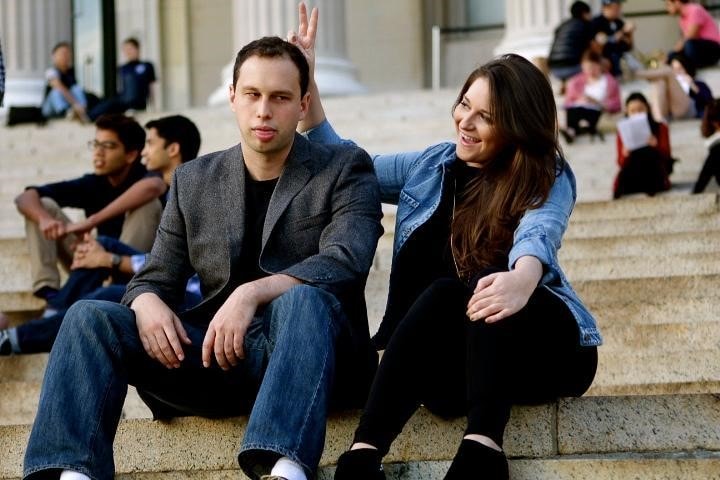Getting a job is hard. Getting a job with little to no experience is even harder. That is where WayUp comes in. They are redesigning and rethinking the job process for college students to make it easier, more enjoyable, and more efficient. How they are doing this is by eliminating job research and instead offering their services, which can choose proximity, season, pay, and position. Their services are offered on their website, WayUp, or you are to access everything from their newly introduced mobile app. We sat down with Nina Boyd, one of the founding team members and currently the Marketing Manager, who gave us a look inside WayUp. Here is a summary of our conversation:
Tyler Russell: Where did the idea for WayUp originate from?
Nina Boyd: WayUp launched in September 2014 by former Google employee Liz Wessel (26 years-old) and former McKinsey analyst JJ Fliegelman (26 years-old). It was originally inspired by a side project that the two put together during their senior year at the University of Pennsylvania, where they learned first-hand about how tough and inefficient the job-search process was for college students. In July of 2014, they decided to leave their dream jobs and officially create Campus Job, which would later change it’s name to WayUp, to help students find all types of opportunities – internships, part-time jobs, brand-ambassador positions, entry-level jobs for graduating seniors, and more.

In the Photo: J.J. Fliegelman (Co-Founder and CTO) with Liz Wessel (Co-Founder and CEO)
TR: What were the original founders’ motives for creating WayUp, did they have issues finding work during college?
NB: Liz and JJ wanted to solve the problem of getting students jobs. The fact of the matter is, with the rising cost of tuition and the reality that most employers expect to see work or internship experience on student’s resumes, students need to work during college. Furthermore, they were upset by how difficult it was for them and their friends to find cool jobs and internships in college (especially those that were out of the realm of what one would typically expect to find posted with Career Services). So, they decided to create a marketplace that helped level the playing field while opening the eyes of all college students.
TR: Is it geared towards a specific sector (i.e. tech or startups) or does it offer a number of jobs?
NB: We offer countless jobs across all different industries. I think what makes our company so special is that we truly have something for everyone. Our sales team works hard to secure a diversity of jobs for our students. We’ve got small mom-and-pop shops in your college town who hire for cashiers or servers, and we’ve got Fortune 500s hiring for summer interns.
TR: What would you consider WayUps’ key to success?
NB: Listening to our users. Everyone from the marketing team, to the product team, to the sales teams, talk to our users everyday. For example, I personally talk to hundreds of students on an average day. We talk to them to understand why they’re looking for a job, what types of jobs they’re looking for, and overall what’s working and what’s not.
Our major product changes are a result our users’ feedback– we even trusted our two summer interns (two undergraduates at Cornell) to re-name our company!

In the Photo: The WayUp team.
TR: Can you talk a little bit about the Y Combinator and what the experience was like?
NB: It’s hard to believe it was almost a year ago! Y Combinator was truly an experience unlike any other. People told Liz and JJ that it was a ridiculous idea and a huge risk to bring 6 team members with them to YC. They did it anyway, and 8 of us lived and worked out of a 5-bedroom house in Los Altos. We worked 13 out of 14 days for 3 months straight, and we grew our company at an unprecedented rate. It was tough and we definitely had a few claustrophobic days (I even walked in on JJ using the bathroom once), but it was an amazing foundation to the group of 30 employees we have now. The experience lives on through the culture we’ve created there, and because YC creates an amazing community not only during the program, but afterwards as well.
Related Articles: “CODECADEMY, HELPING MILLIONS OF LEARNERS AROUND THE WORLD”
“THE NEW HORIZONS OF REGENERATIVE MEDICINE: DANNY CABRERA, FOUNDER OF BIOBOTS”
TR: Who are your main competitors and what is your competitive advantage?
NB: It might sound odd, but our biggest competitor at the moment is nepotism. The job search should not just be about knowing the right people or having the right connections. We’re democratizing the way students find jobs. The advantage lies in the fact that we’re truly a two-sided marketplace. We’re diversifying the experience for both the students and the employers that use our site. Companies are easily able to set expectations and find quality applicants within a matter of hours. Reversely, students are able to save their information, sort through what looks interesting to them, and apply to jobs without ever leaving our site. At the age of 19 or even 21, it shouldn’t be about who you know, especially after you pay up to $250K for your education!
TR: How do you see social media influencing the job market?
NB: Social media has caused the job market to expand. There are so many jobs now that didn’t exist before- and so many ways to perform those jobs without having to be in a physical office. For example, you can launch an entire marketing campaign through social media and can communicate with different brands and users all over the world. Students often use WayUp to find jobs like this and are able to manage these positions from their dorm rooms. We have one user who even paid off his entire freshman year tuition at NYU by working from his dorm room. Then, he was able to inspire other students to look for jobs by sharing this video on Instagram and Facebook.
 In the Photo: Homepage of WayUp
In the Photo: Homepage of WayUp
TR: Do you see technology helping promote social progress?
NB: Definitely. In fact, CNN named WayUp one of the top 30 companies changing the world this past year! Technology connects people in a way that didn’t used to be possible. In the past couple of years, social media has become an amazing tool for groups that lacked resources in the past.
Companies are looking for students who demonstrate a clear passion about something and a willingness to allocate that within the position.
TR: Is your company directly involved in any philanthropy projects?
NB: Our company does various team volunteer projects, and many employees at WayUp also volunteer with their free time, whether it be for CASA, at local hospitals, etc. This past month, everyone at the company left the office on a weekday and volunteered together at Housing Works in Long Island City. Furthermore, one of my favorite ways to give back is by partnering with student groups on campus through our Campus Rep program. Through this program, we’ve been able to identify groups on campus trying to make a positive change, and partner with them to donate money to local and national charities. On the business side of things,we love working with non-profits, and always offer them a large on-the-house discount.
TR: If you had to give one piece of advice to a student applying to their dream job- what would it be?
NB: Show them you’re hungry and ready to learn- if you don’t have a 4.0 and an internship at a Fortune 500, that’s okay. Come to the table with well-researched questions or ideas for that specific team. Companies are looking for students who demonstrate a clear passion about something and a willingness to allocate that within the position.














